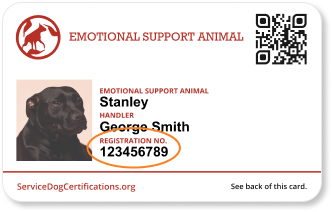Emotional Support Animal ID Card
$39
There was a problem with your submission. Please review the fields above.
Search the Emotional Support
Animal Registry
Use the ID number to search our online database and verify the ESA is registered with us.
Hundreds of Thousands of Registered
Benefits of ESA Registration
- Ease of IdentificationA registered ID card can quickly identify your animal as an ESA, reducing potential confrontations or misunderstandings. Many may wonder why your pet is in the building when a no-pets rule is in place. Having an ID is easier than carrying around your ESA letter.
- Awareness A registered ID card can help create awareness about your ESA, signaling to others that your animal is not just a pet. That can make things easier with curious neighbors and staff.
- Compliance ESA owners know that building staff will often badger them to see an ID or proof of registration for their ESA.
 Instead of arguing with them, some find it easier to present an ID for their ESA.
Instead of arguing with them, some find it easier to present an ID for their ESA.

 Instead of arguing with them, some find it easier to present an ID for their ESA.
Instead of arguing with them, some find it easier to present an ID for their ESA.